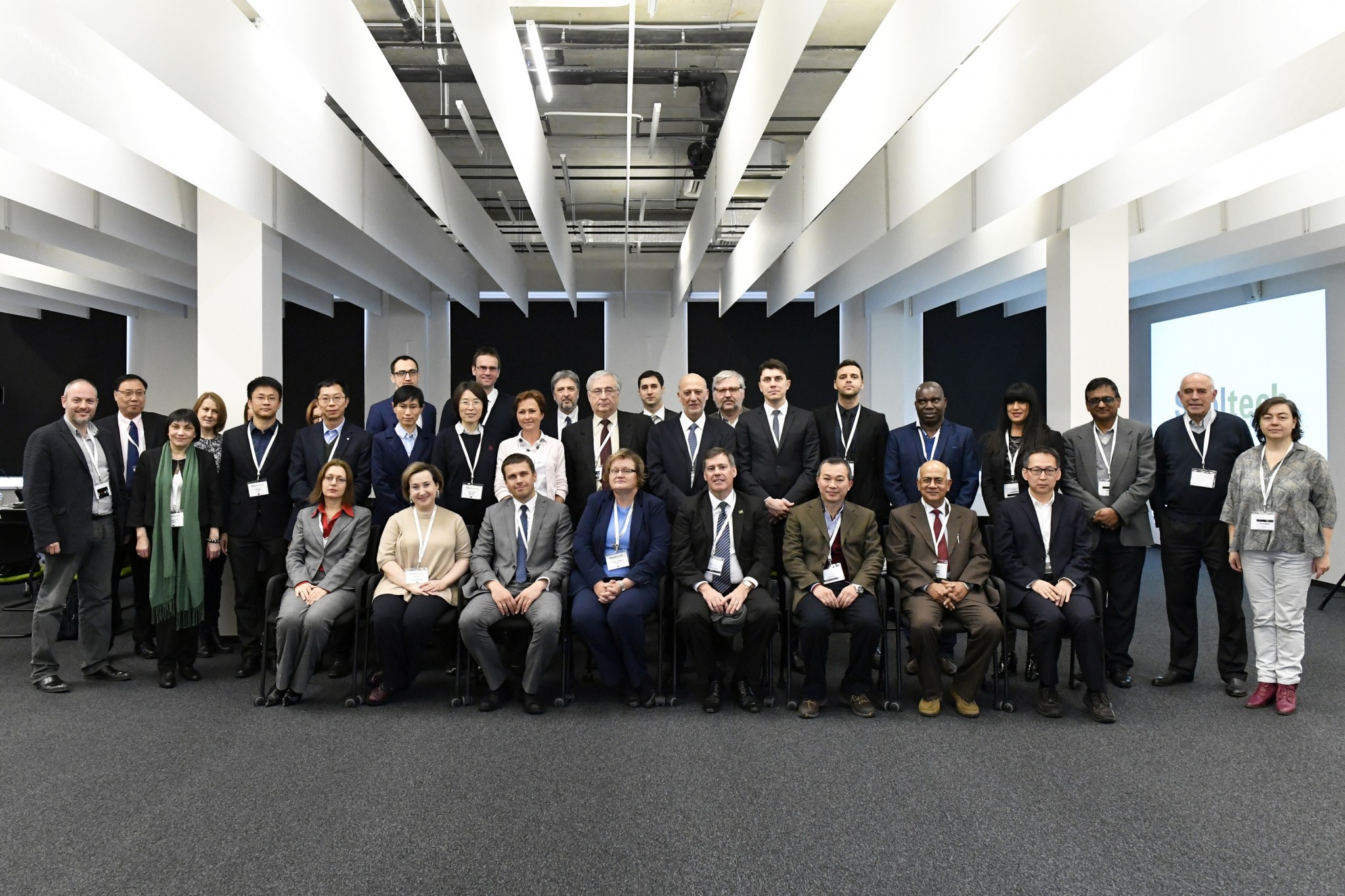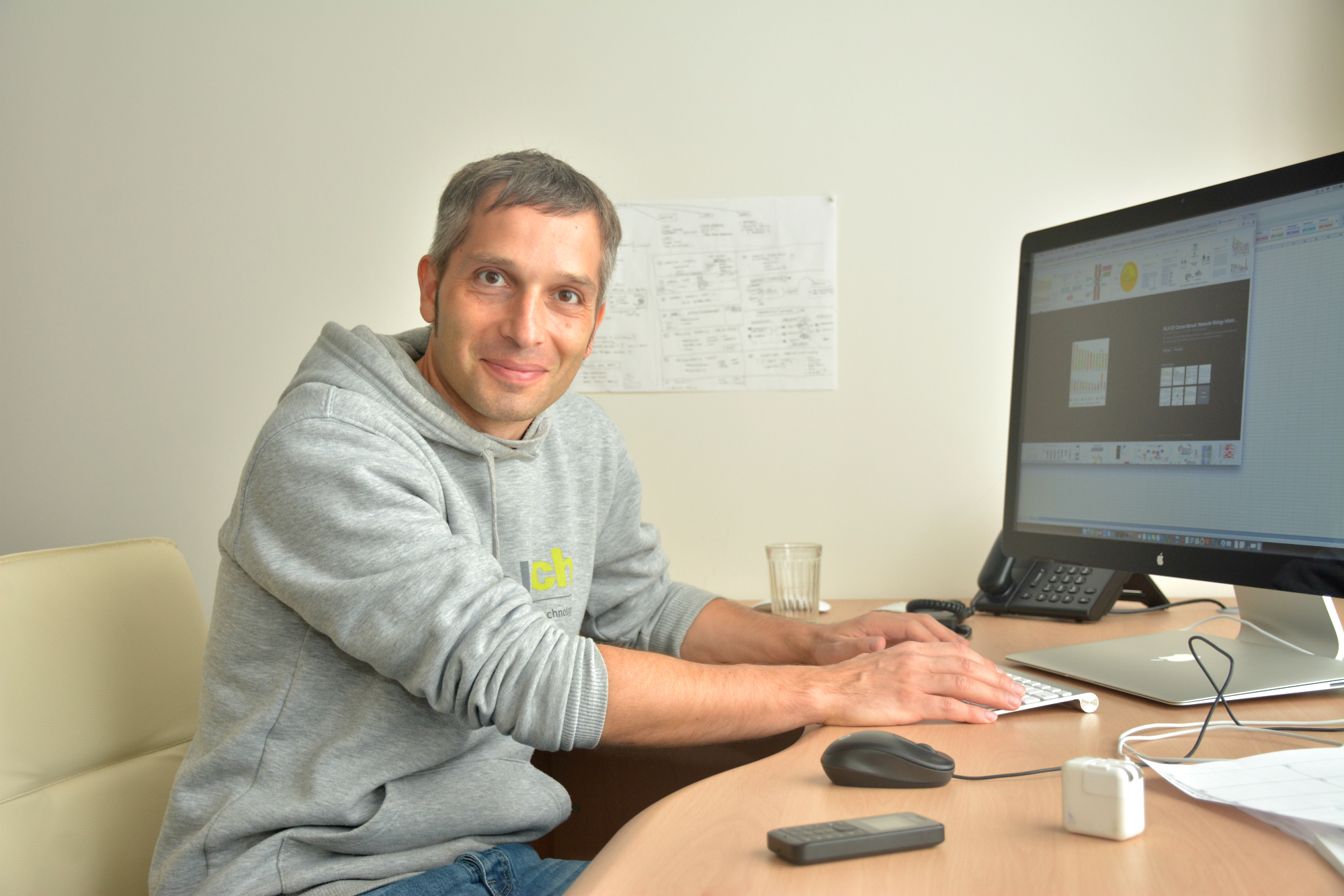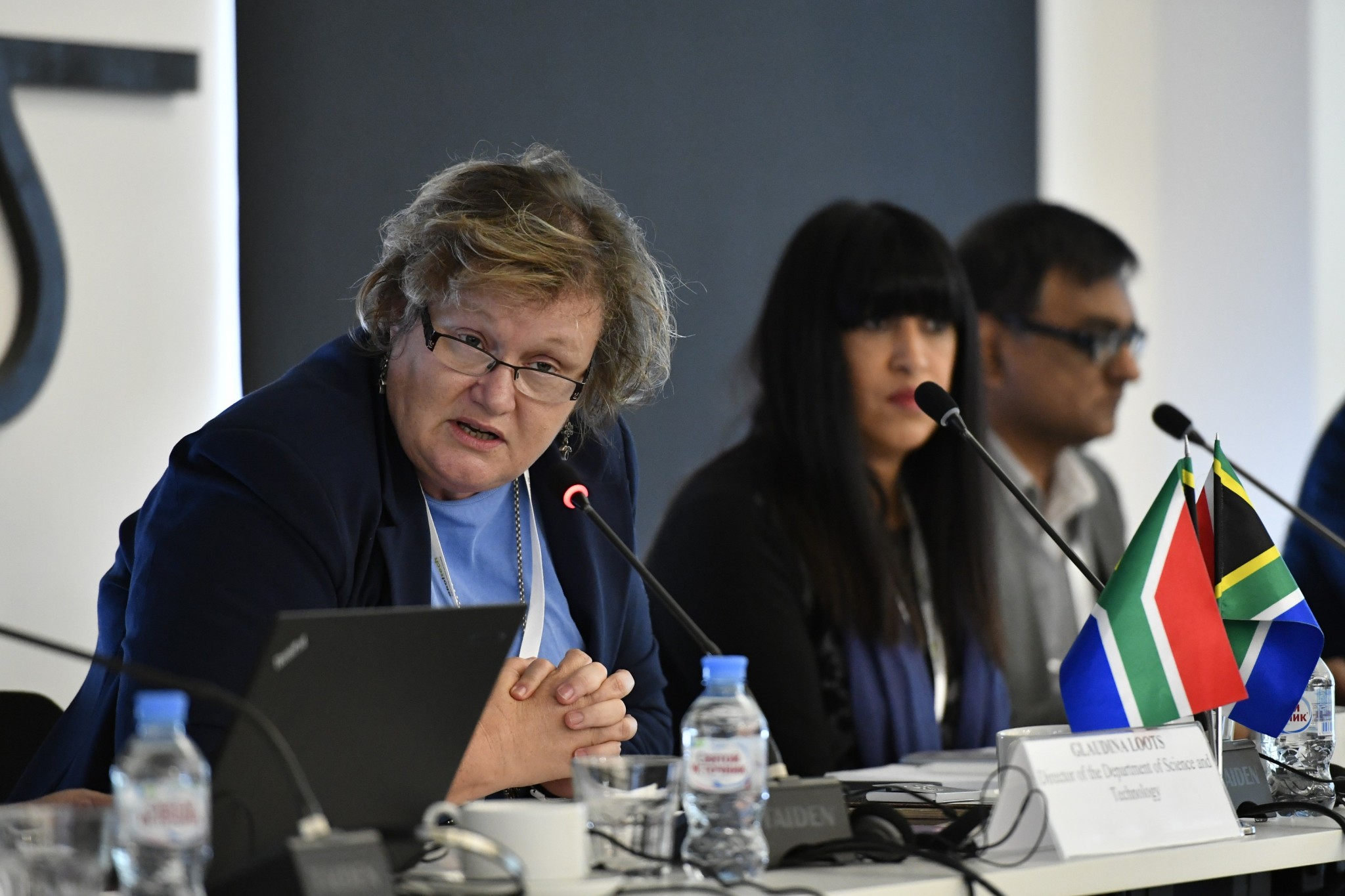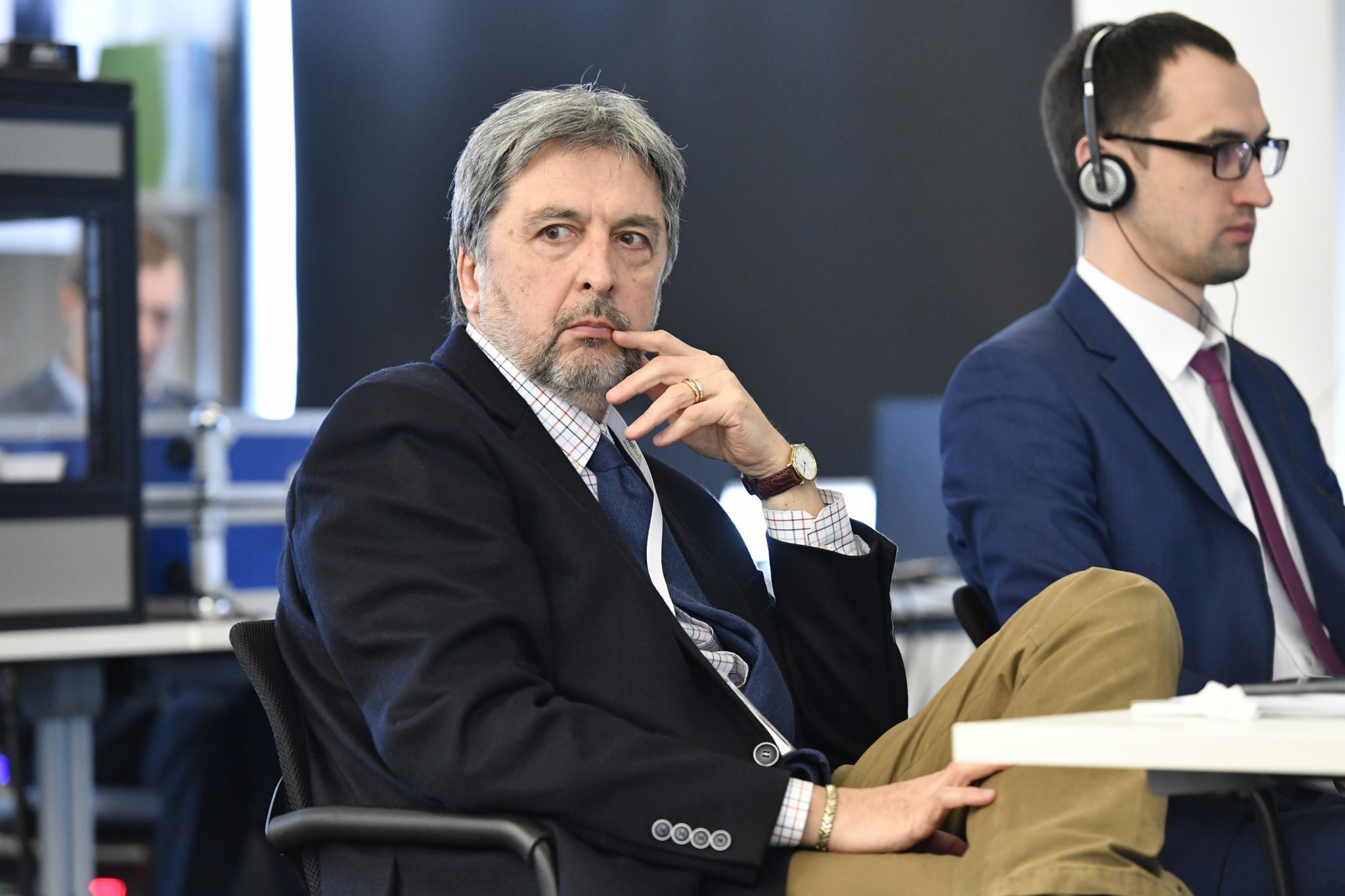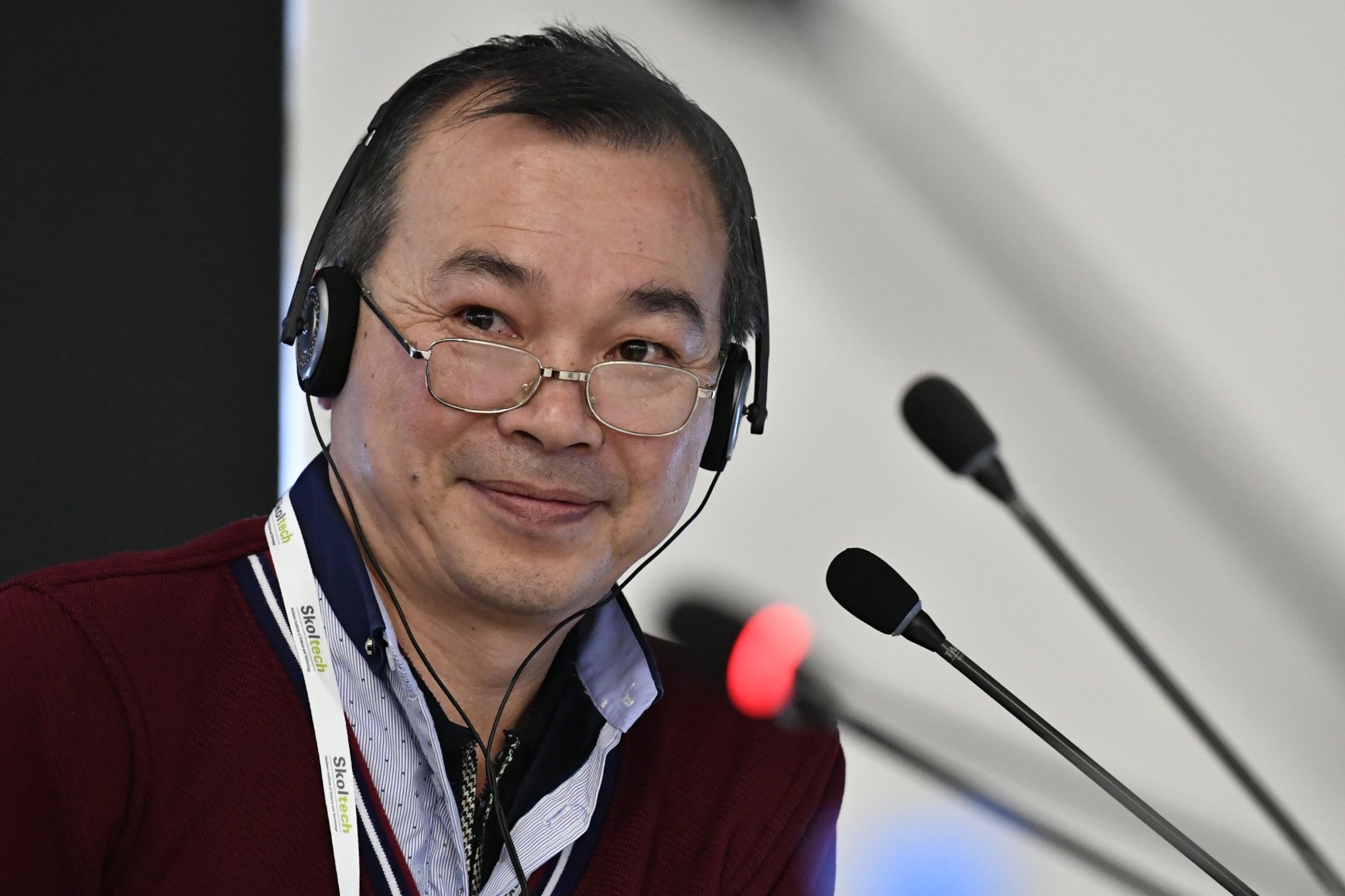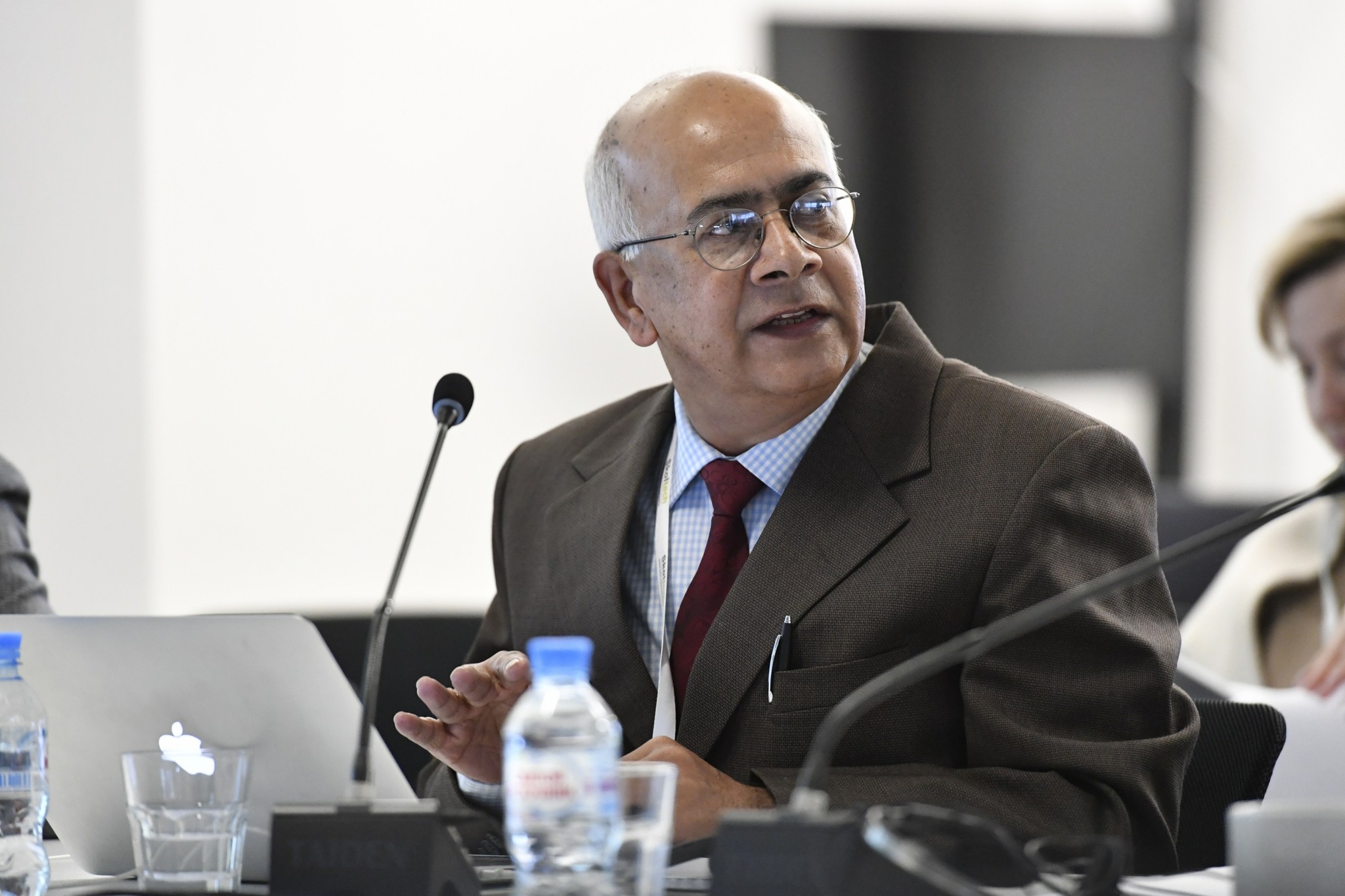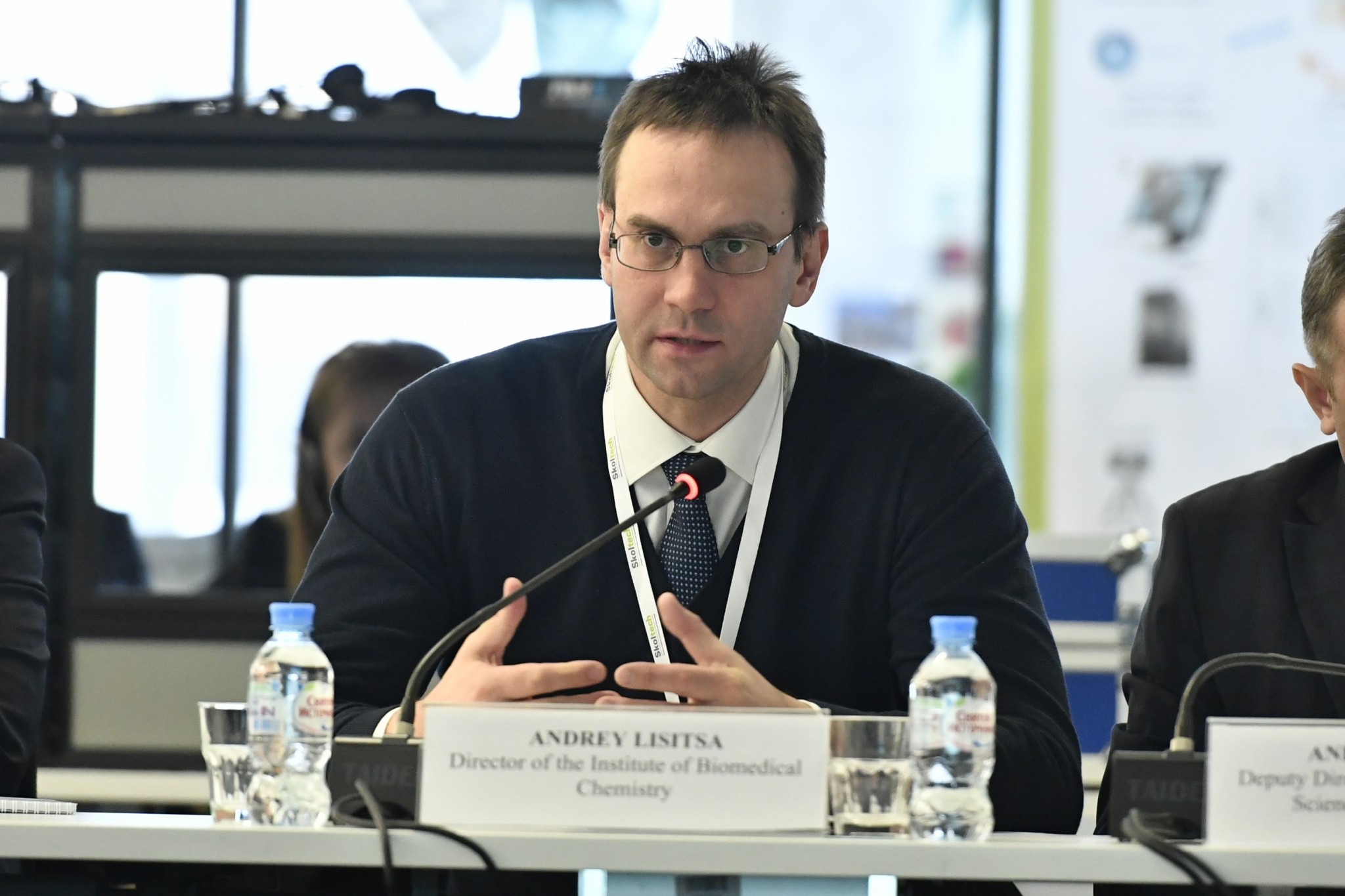Representatives of Brazil, Russia, India, China and South Africa gathered at Skoltech last week for the inaugural meeting of a new biotechnology and biomedicine working group established by the BRICS international association.
The Working Group on Biotechnology and Biomedicine including Human Health and Neuroscience (Working Group) was established at the 4th BRICS Science, Technology and Innovation Ministerial Meeting on 8 October 2016 in Jaipur, India.
Irina Kuklina, Executive director of Russia’s International Centre for Innovation in Science, Technology and Education, explained that the establishment of the Working Group fell in line with a generalized push to increase scientific, technological and innovation cooperation among the BRICS nations.
In 2015, BRICS ministers signed a Memorandum of Understanding on science, technology and innovation, which outlined cooperation goals related to a wealth of areas, ranging from food security and natural disasters to geospatial technology and medical sciences.
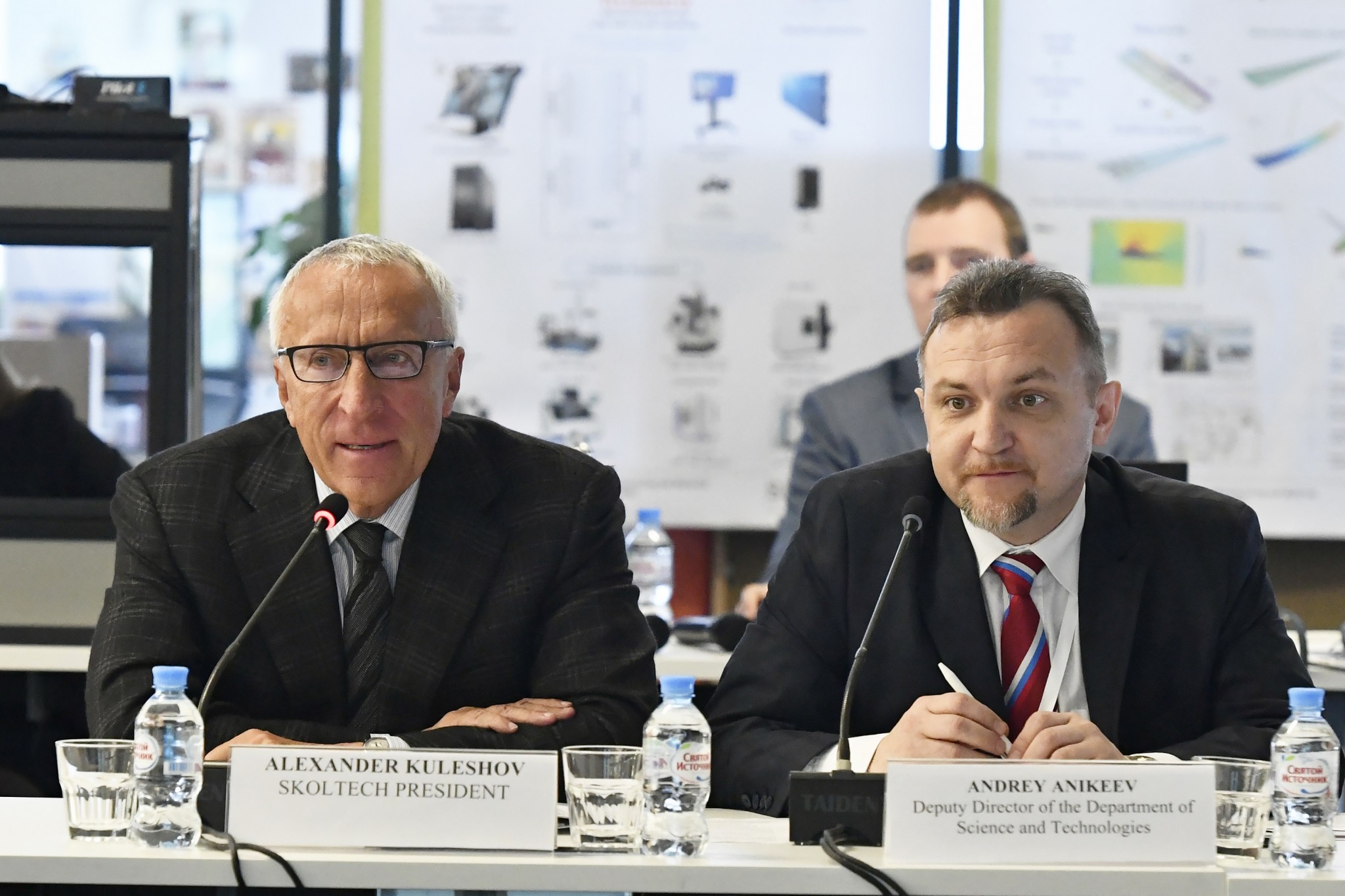
Skoltech President Alexander Kuleshov delivers remarks at the start of the BRICS conference. Photo: Skoltech.
“The working groups were set up as a mechanism to address the particular areas that the BRICS countries want to coordinate activities on,” said Kuklina, whose organization plays a key role in coordinating and reporting on Russian science and technology activities for BRICS.
In creating the Biotechnology and Biomedicine Working Group, the BRICS ministers aimed to promote cooperation among BRICS countries in these fields, and to support and promote initiatives in these areas to address common global and regional socio-economic challenges.
During the conference, they focused on two key issues: antibiotic resistance and cognitive disorders.
On the sidelines of the conference, we caught up with representatives of each country to learn more about the aspirations driving the Working Group, as well as the challenges they’re up against in achieving these goals.
Why has the Working Group opted to focus on cognitive disorders and antibiotic resistance?
“After the BRICS ministers settle on a general priority area, it’s up to the research community – scientists and high-tech companies – to specify which areas in that field should take priority,” said Kuklina. “Russia and Brazil are the key coordinating countries for biomedical sciences, so when the Working Group was established, these two countries selected antibiotic resistance and cognitive disorders as key priority areas. All the other countries agreed.”
In the view of Professor Roman Kozlov, the Russian Health Ministry’s Chief Specialist on Clinical Microbiology and Antimicrobial Resistance and a Corresponding Member of the Russian Academy of Sciences, antimicrobial resistance is a global issue with specific relevance to the BRICS countries, making it an ideal starting point for increased multilateral health collaboration.
As a whole, antimicrobial resistance – which encompasses maladies that are resistant to antibiotic, antifungal, antiviral and antiparasitic medications – poses an immense and indisputable threat.
The World Health Organization (WHO) ranks antibiotic resistance as one of the most significant threats to global health, food security and development. According to the Review on Antimicrobial Resistance (RAR), in the absence of massive global action, drug-resistant infections will surge in the coming years, claiming the lives of some 10 million people annually by 2050. In 2016, the UN General Assembly committed to take global action to combat the threat.
“Antimicrobial resistance is a global issue. When it was brought up before the UN General Assembly last year, this was the fourth time in the history of the UN General Assembly that a medical issue was brought to discussion,” he said.
He added with respect to the BRICS-specific threat: “The BRICS countries are experiencing a substantial problem with antimicrobial resistance. That’s why close discussion within the BRICS countries is extremely important in order to develop a common approach to curbing the threat,” he added.
Professor Philipp Khaitovich explained that cognitive disorders constitute a significant burden on the healthcare budgets of many countries worldwide due to the fact that people tend to receive treatments for cognitive disorders for many years – sometimes over the course of a lifetime, and sometimes for a relatively lengthy period of old age.
“Cognitive disorders are becoming increasingly costly, both in terms of medical budgets and social burdens, as family members often play a role in caring for people living with cognitive disorders,” he said. “This is because more and more people are surviving into old age, leading to a larger proportion of individuals with age-related impairments. Other cognitive disorders – such as autism and depression – are also on the rise in many countries worldwide, such as throughout the BRICS countries.”
He added that going forward, Big Data will be a key source of neuroscientific advances, and that with their powers combined, the BRICS countries could generate a wealth of useful data in the coming years.
“Medical organizations – private and public – generate more data than any scientific labs, because they use state of the art equipment that can obtain lots of data from each patient, but this data is not united and not fully taken advantage of by individual institutions due to resource limitations,” he said. “The BRICS-wide collection and analysis of data – which would create a giant infrastructural network with billions of data points, each containing rich levels of information – would enable us to gain much deeper insights into the mechanisms, types and possible outcomes of disease and the selection of efficient treatment and prevention strategies.”
Dr. Glaudina Loots, Director of Health Innovation at the South African Department of Science and Technology, explained that while both antibiotic resistance and cognitive disorders constitute global challenges, the latter also has specific importance for her home country, but that an aging population isn’t the concern.
“We are seeing a lot of problems based on the effect that HIV infections have on cognitive disorders and related issues,” she said, noting that this is an area ripe for innovative research.
Dr. Dinakar Salunke, Director of the International Centre for Genetic Engineering and Biotechnology New Delhi, who was leading the Indian delegation at the conference, believes the two areas present distinct but pivotal challenges.
“Antibiotic resistance is an increasing menace that everybody fears. No matter how many times we think that a disease is over, you realize that the pathogens are changing; the vectors are manipulating. We are having patients coming that are not getting cured by drugs. This is happening all over the world. So it’s the most important common point for the five countries to collaborate,” he said. “And neuroscience has been a frontier science, and it is at an exciting stage at this time.”
On the whole, Salunke expects these challenges to inspire fast action: “Antibiotic resistance is a necessity and neuroscience is at an exciting stage they would naturally inspire collaborations. So, I think these key areas would certainly bring urgency to the partnerships.”
Looking at the bigger picture, what are the key goals of this new Working Group?
In the view of Dr. Luiz Henrique Mourão do Canto Pereira – National Coordinator for Health and Biotechnology for the Brazilian Ministry of Science, Technology, Innovations and Communications – the Working Group’s primary task is to bolster ties among the BRICS countries in the fields of biomedicine and biotechnology.
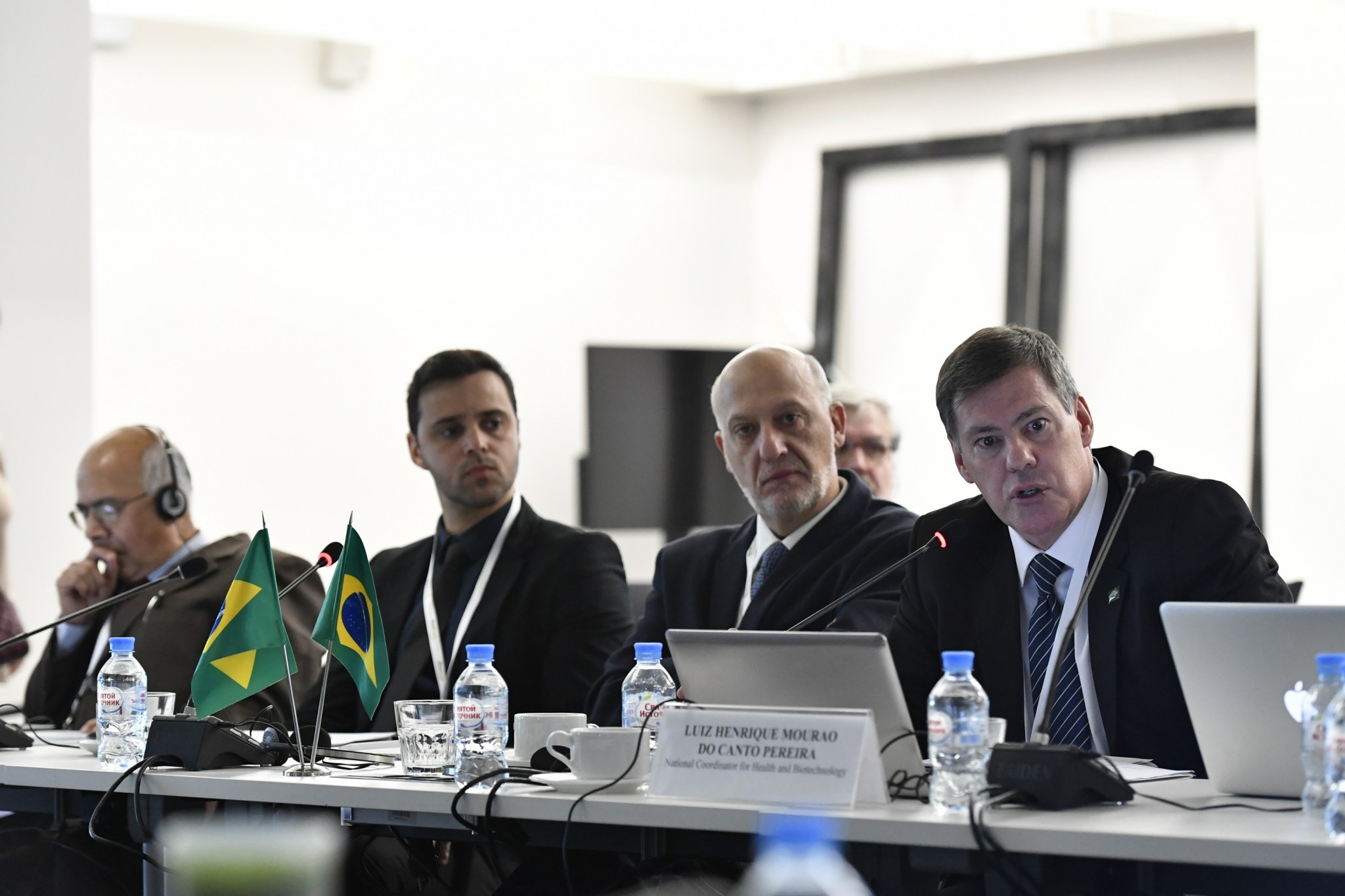
Members of the Brazilian delagation, including Dr. Luiz Henrique Mourão do Canto Pereira (right). Photo: Skoltech.
“The aim is to strengthen the collaboration among research groups in the BRICS countries, because we have some bilateral cooperation, but we lack multilateral cooperation among all five countries in this area. So we need to strengthen the collaboration through joint calls in order to create an environment of cooperation,” he said.
Dr. Zheng Zeng, a Professor of Medicine at Peking University First Medical School who led the Chinese delegation at the conference, also opined that a desire to boost multilateral research was at the heart of the Working Group’s origin.
“The group was founded in order to foster collaboration among the BRICS countries in the area of human health, and the BRICS countries face many of the same problems in this respect,” he said.
With respect to the common maladies the BRICS countries are grappling with, Loots noted the importance of solving problems within the alliance, rather than relying exclusively on other countries.
“A number of diseases are actually very prevalent across the five countries and it’s essential that we start working together and finding solutions, and that we’re not only dependent on America or Europe to do it for us – that we actually do it ourselves, because we have to make sure that the solutions we find are actually applicable to our countries. So it’s a sense of common need that’s driving the process,” she said.
In the opinion of Dr. Vladimir Shukhov – a leading expert at Russia’s Center for Strategic Planning and Management of Medico-Biological Health Risks, which operates under the Russian Health Ministry – a key task for the Working Group will be that of acting as an intermediary between scientists and policymakers to ensure that research can be conducted as efficiently and with as few bureaucratic obstacles as possible.
“If we have a common vision, a common understanding, common problems or tasks that can’t be resolved by one country or economy alone, and problems which are common for all, it’s a priority to address them. But to coordinate this, you need some kind of not-very-bureaucratic organization such as this Working Group. The main task for such a group is just to define what, where and by whom, and then just to help with organizational and technical issues,” he said.
Toward this end, Brazil’s Mourão do Canto Pereira said he believes the Working Group will be successful in this endeavor due to the unique strengths each country brings to the table.
“All five BRICS countries have complementary strengths,” he said. “For instance in Brazil we have a large number of research groups that are quite strong in basic science, especially in biotech. We have to strengthen some phases of development in this sphere, such as by scaling up our pre-clinical and clinical research. In India, they’ve managed to do that much faster than in Brazil. That also happened in China, and nowadays in Russia and South Africa as well.”
What key milestones should the Working Group focus on going forward?
Russia’s Kozlov believes that the Working Group must next take concrete steps to implementing collaborative efforts based on the conference.
“First of all, we need to see a memorandum or conclusory resolution of this meeting. It should contain a maximum of three main objectives to concentrate on. The issues raised within antimicrobial resistance, for instance, are endless. We can’t resolve it in one day. It’s so complex that you need to isolate the major objectives that all the BRICS countries can agree upon. After this, you will see real results that will lead to action. That will be the ultimate success story,” he said.
China’s Zeng also urged specific and concerted action, noting that it is critical for the group to use its expertise in order to make policy recommendations aimed at curbing the threat of antibiotic resistance.
“Many people around the world use a lot of antibiotics, which results in antibiotic resistance. This is a big problem. So it is imperative that we work to resolve this issue. It is important that we work to establish guidelines on how antibiotics should and should not be used,” he said.
Russia’s Shukhov hopes that going forward, the working group will expand its scope, addressing broader issues that affect the global population as a whole.
“In my opinion, it would probably be better to focus – in addition to the existing topics – on problems of public health and broad aspects of health science – that would cover two areas that need to be digested by every country. Public health refers to what is important to improving upon the main problems in the health sector – HIV, tuberculosis, sexually transmitted infections, stroke, etc. From the other side, we have health science. One side is more implicational, and the other side refers to fundamental science. Science without implication serves little purpose. But in combination, these two sides meet the needs of everybody,” he explained.
Meanwhile, India’s Salunke believes a major milestone has already been achieved.
“I think the very idea of having a working group in these areas, particularly to work collaboratively, is fascinating,” he said. “It is now understood that the old days – when discoveries were made by individual scientists – are over. Any research in modern biotechnology requires collective wisdom, because it is based on a large amount of data generated by large teams. It’s extremely useful to think together. There are a lot of common things among us that would make a homogenous group of these five countries, with a lot of common problems to be addressed and a lot of common interests. So, for this commitment from the five countries to come together and address such problems by itself is an excellent step.”
Likewise, in a brief interview after the conference, Russia’s Kuklina expressed optimism that the meeting had been fruitful.
“As a result of the meeting of representatives of all five countries, they have agreed on terms of reference for the Working Group, they have agreed on a particular action plan, and they have agreed on particular topics that need to be brought to BRICS senior officials and ministers. These are the most important points.”
Dr. Andrey Lisitsa, a member of the Russian Academy of Science and Director of the Institute of Biomedical Chemistry, was satisfied that the delegates had accomplished all they had hoped to accomplish at the conference: “The BRICS meeting at SkolTech was a success. People are people; it was interesting to meet each other. We shared ideas that are common to all of us. It is necessary to talk, but also it is necessary to do. In my opinion, we decided to inspire action on behalf of our Governmental Bodies for deeper collaboration in biomedicine and biotechnology within BRICS. Big Data equals Big Responsibility.”
